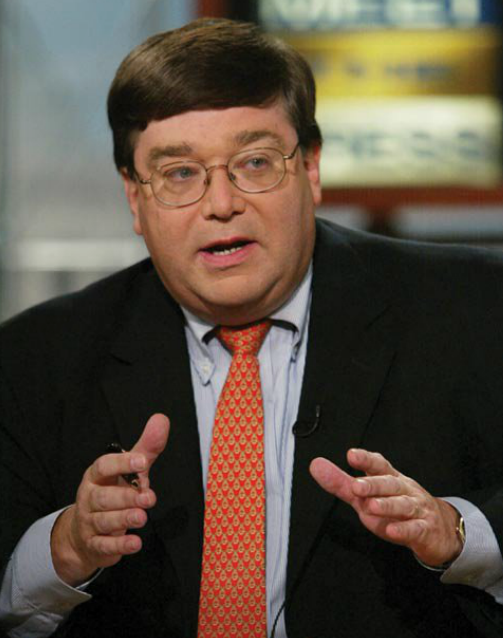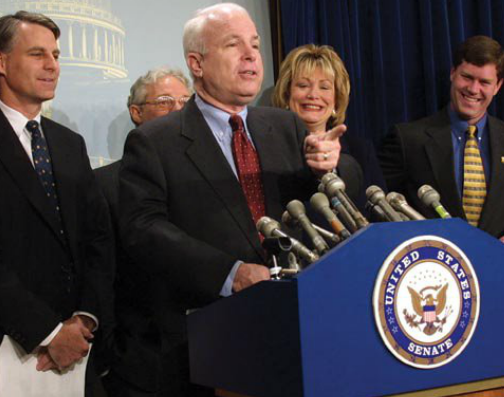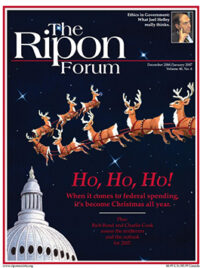Charlie Cook is the Publisher of The Cook Political Report, and a political analyst for the National Journal Group, where he writes weekly for National Journal magazine and Congress Daily/AM. He also writes a regular column for the Washington Quarterly, published by the Center for Strategic and International Studies, and is a political analyst for NBC News.
Widely regarded as one of the nation’s leading authorities on U.S. elections and political trends, Cook has also become widely recognized for his regular appearances on “Meet the Press,” “Good Morning America,” and other cable and television broadcast news programs. The New York Times has called him, “…one of the best political handicappers in the nation” and noted that The Cook Political Report is “…a newsletter that both parties regard as authoritative.” The Wall Street Journal’s Al Hunt has called Cook “the Picasso of election analysis,” while David Broder of The Washington Post has written that Charlie Cook is“perhaps the best non-partisan tracker of Congressional races.”
Cook lives in Chevy Chase, Maryland with his wife Lucy and three children, Rebecca, David and Jeffrey.
∗∗∗∗∗∗∗∗∗∗∗∗∗∗∗∗∗∗∗∗∗∗∗∗∗
RF: Did Republicans lose the November elections because they ceded the center or because their political base did not turnout?
Cook: More of the former than the latter but a little bit of both. The Republican share of the turnout in 2006 was three points below 2002, the last midterm election, so there was disillusionment among Republicans. But I think the strategy of organically growing the conservative base as opposed to connecting with weak Republicans, independents and weak Democrats was the bigger problem.

Symbolically speaking, the Republican Party has moved its headquarters from Indianapolis or Columbus to Dallas, and the new direction – with its focus on social and cultural issues and the sharper edges – has come at a real cost, virtually destroying the party in New England, hurting it badly in the Northeast, and to a lesser extent the Midwest and West Coast.
Many secular Republicans, those with little or no social/cultural agenda, or those with more centrist views on those issues, have come to feel disenfranchised, and independents are totally alienated by the GOP.
RF: One of the hallmarks of independent voters is their belief in compromise – that is, their belief that Republicans and Democrats should set aside partisan differences and work together to get things done. Does this present a problem for those in the GOP who believe the party will regain its majority only through confrontation and by sharpening their differences with Democrats?
Cook: I think there is plenty of blame on both sides of the aisle, Democrats back in the 1980s and early 1990s, Republicans more recently. But some of the blame is systemic.
As you started seeing more and more Members of Congress leaving their families back home, turning Congress into a Tuesday through Thursday club, minimal socialization between Members of different parties and ideologies, less foreign travel for most members (I believe in the adage that you never really know someone until you travel with them), the tougher, nastier campaigns and advertising… all of these things have contributed to heightened partisanship. These Members don’t know each other, they don’t like each other, and, most importantly, they don’t trust each other.
Congress has become a dysfunctional institution. I don’t know how this can be changed.
…I think the strategy of organically growing the conservative base as opposed to connecting with weak Republicans, independents and weak Democrats was the bigger problem.
RF: Tip O’Neill once famously stated that, “All politics is local.” In today’s era of Internet blogs and 24/7 cable news coverage, do you think that is still true?
Cook: In four out of five midterm election years and– in terms of the House, Senate and gubernatorial races– nine out of ten presidential election years, all politics is local. But in one of out five midterms and one out of ten presidential election years, all politics isn’t local, and national dynamics kick in.
The important thing is to be able to ascertain before the election whether it will be a normal election (such as in 1996, 1998, 2000, 2002 and 2004) or an abnormal election (such as in 1958, 1964, 1966, 1974, 1980, 1982, 1994 or 2006). The signs seemed pretty clear to me over the summer that this was going to be an abnormal election when all politics wouldn’t be local.
I don’t think this has anything to do with 24/7 news or blogs or anything. It is when the electorate is angry, fed up or there is a consensus rejection of one party.
While centrists are decidedly in the minority in each party, it is possible to cobble together a centrist majority on many issues. It just won’t be easy.
RF: What do you think will be the key issues on the 2007 legislative agenda?
Cook: I think it is very difficult when Congress is so evenly divided and you have a lame duck president with low poll numbers to see a lot getting done.
Obviously there are enormous problems facing the country—budget deficits, Social Security, Medicare and Medicaid, greater energy independence, controlling the costs of health care without stifling essential research—but it is very hard to see the kind of leadership, the kind of risk-taking that is necessary to solve or at least substantially address these problems.
RF: Finally, do you think the 2007 legislative agenda will be impacted at all by the start of the 2008 presidential campaign?
Cook: With almost a tenth of the Senate running for President, both parties are as nervous and cautious as long-tailed cats in a room full of rocking chairs. It just makes anything and everything harder to accomplish than would otherwise be the case, and the window of getting anything done much narrower.
What it will take is Members on both sides to have the guts to keep an arms length from their leaderships and to forge their own coalitions and make one or both parties come to them to get anything done. While centrists are decidedly in the minority in each party, it is possible to cobble together a centrist majority on many issues. It just won’t be easy.





